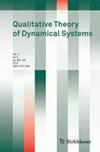分式延迟微分方程和受控弱奇异 Volterra 延迟积分方程的庞特里亚金最大原则
IF 2.1
3区 数学
Q1 MATHEMATICS
引用次数: 0
摘要
本文探讨了两个不同的问题。首先,我们分析了有关分数延迟微分方程的庞特里亚金最大原则。此外,我们还研究了解决与式(1.1)及其相应的报酬函数(1.2)相关的控制问题的最有效方法。随后,我们在 Volterra 延迟积分方程 (1.3) 的框架内探讨了庞特里亚金最大原则。在文章的最后,我们通过举例说明来强化我们的研究成果。本文章由计算机程序翻译,如有差异,请以英文原文为准。
Pontryagin Maximum Principle for Fractional Delay Differential Equations and Controlled Weakly Singular Volterra Delay Integral Equations
This article explores two distinct issues. To begin with, we analyze the Pontriagin maximum principle concerning fractional delay differential equations. Furthermore, we investigate the most effective method for resolving the control problem associated with Eq. (1.1) and its corresponding payoff function (1.2). Subsequently, we explore the Pontryagin Maximum principle within the framework of Volterra delay integral equations (1.3). We enhance the outcomes of our investigation by presenting illustrative examples towards the conclusion of the article.
求助全文
通过发布文献求助,成功后即可免费获取论文全文。
去求助
来源期刊

Qualitative Theory of Dynamical Systems
MATHEMATICS, APPLIED-MATHEMATICS
CiteScore
2.50
自引率
14.30%
发文量
130
期刊介绍:
Qualitative Theory of Dynamical Systems (QTDS) publishes high-quality peer-reviewed research articles on the theory and applications of discrete and continuous dynamical systems. The journal addresses mathematicians as well as engineers, physicists, and other scientists who use dynamical systems as valuable research tools. The journal is not interested in numerical results, except if these illustrate theoretical results previously proved.
 求助内容:
求助内容: 应助结果提醒方式:
应助结果提醒方式:


